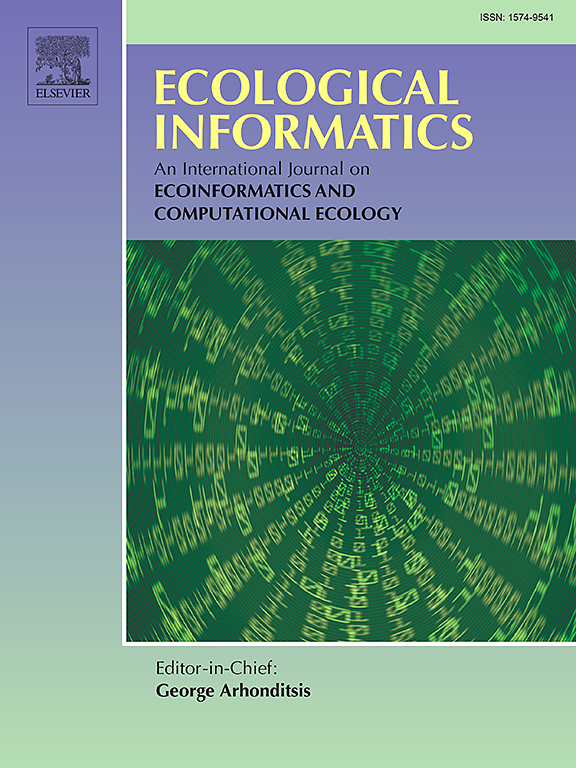Landscape and climatic factors shaping mosquito abundance and species composition in southern Spain: A machine learning approach to the study of vector ecology
IF 5.8
2区 环境科学与生态学
Q1 ECOLOGY
引用次数: 0
Abstract
Vector-borne diseases pose significant challenges to public health, with mosquitoes acting as crucial vectors for pathogens globally. This study explores the interaction between environmental and climate factors, investigating their influence on the abundance and species composition of mosquitoes in southwestern Spain, a region endemic to several mosquito-borne diseases.
Using comprehensive field data from 2020, we analysed mosquito abundance and species richness alongside remote sensing variables and modeling techniques, including the machine learning Random Forest. We collected 5859 female mosquitoes representing 13 species. Non-linear correlations were observed between mosquito abundance and climatic variables, notably temperature and rainfall. Extremely high temperatures correlated with a decrease in mosquito abundance, while accumulated rainfall in the three weeks preceding sampling positively impacted mosquito abundance by providing breeding habitats. A positive correlation between Normalized Difference Vegetation Index (NDVI) and mosquito metrics was also found, aligning with prior studies highlighting vegetation's role shaping mosquito habitats. Interestingly, a negative relationship was observed between mosquito species richness and autumn NDVI. Additionally, wind speed negatively affected mosquito species richness.
This research provides valuable insights into the ecological determinants of mosquito abundance and species composition in a Mediterranean climate. These findings are crucial for understanding disease transmission dynamics and improving vector control strategies. By integrating climatic characteristics into public health interventions, management measures can become more targeted and efficient, especially during periods of heightened temperature.
影响西班牙南部蚊子数量和物种组成的景观和气候因素:病媒生态学研究的机器学习方法
病媒传染的疾病对公共卫生构成重大挑战,而蚊子是全球病原体的重要载体。本研究探讨了环境和气候因素之间的相互作用,研究了它们对西班牙西南部蚊子数量和物种组成的影响,该地区是多种蚊媒疾病的流行区。我们利用 2020 年的综合实地数据,结合遥感变量和建模技术(包括机器学习随机森林),分析了蚊子数量和物种丰富度。我们收集了代表 13 个物种的 5859 只雌蚊。在蚊子数量与气候变量(尤其是温度和降雨量)之间观察到了非线性相关性。极高的气温与蚊子数量的减少有关,而采样前三周的累积降雨量则通过提供蚊子繁殖栖息地而对蚊子数量产生积极影响。归一化植被指数(NDVI)与蚊子指标之间也发现了正相关,这与之前强调植被塑造蚊子栖息地作用的研究一致。有趣的是,蚊子物种丰富度与秋季归一化差异植被指数之间呈负相关。这项研究为了解地中海气候中蚊子数量和物种组成的生态决定因素提供了宝贵的见解。这些发现对于了解疾病传播动态和改进病媒控制策略至关重要。通过将气候特征纳入公共卫生干预措施,管理措施可以变得更有针对性和更有效率,尤其是在气温升高期间。
本文章由计算机程序翻译,如有差异,请以英文原文为准。
求助全文
约1分钟内获得全文
求助全文
来源期刊

Ecological Informatics
环境科学-生态学
CiteScore
8.30
自引率
11.80%
发文量
346
审稿时长
46 days
期刊介绍:
The journal Ecological Informatics is devoted to the publication of high quality, peer-reviewed articles on all aspects of computational ecology, data science and biogeography. The scope of the journal takes into account the data-intensive nature of ecology, the growing capacity of information technology to access, harness and leverage complex data as well as the critical need for informing sustainable management in view of global environmental and climate change.
The nature of the journal is interdisciplinary at the crossover between ecology and informatics. It focuses on novel concepts and techniques for image- and genome-based monitoring and interpretation, sensor- and multimedia-based data acquisition, internet-based data archiving and sharing, data assimilation, modelling and prediction of ecological data.
 求助内容:
求助内容: 应助结果提醒方式:
应助结果提醒方式:


